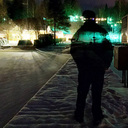4 Likes
Here it is, the last of the species autosaurus giganticus. Never again would beasts of this size roam our freeways and driveways with their EPA stickers (10/12) still freshly removed.
It was the end of an era; the giant American land cruiser became extinct when the last 1979 Town Car rolled off the lines. And that last roll took a while: two hundred thirty three and seven-tenths inches of steel, chrome, vinyl and deeply tufted leather. But really big cars were such a part of the American psyche, that when they were gone, it left a gaping hole. You don’t miss your water ’till the well runs dry.
I may have mixed feelings about some of the other big old Lincolns, but these last Town Cars, from ’77-’79, were such bold survivors like the last Wooly Mammoths that roamed the earth, that I can’t help but be in (shock and) awe. The transplanted fake Rolls Royce-like grille from the Mark IV only added to their outrageous rebellion against the grain of the times.
Cadillac and the rest of GM had dramatically downsized in 1977. Chrysler’s increasingly irrelevant big cars were gone after 1978. But Lincoln held out, for even one more year after its stablemates, the big Fords and Mercuries, had jumped into the hot wash cycle. Lincoln finally hit the big volume jackpot in the mid-late seventies. This 1977 Town Car is one of almost 200k Lincolns produced that year, about eight times what the classic ’61 Continental sold at. There was still a healthy gap between it and Cadillac, but nothing like earlier days. The Mark III coupe had been a fairly successful extension of the line, and the Mark IV was a really BIG hit. Well, it was the blow out, before the crash. Downsizing these slabby Lincolns did not go over well . These cars epitomized the changes that had taken place in the US since the early sixties. The Kennedy Lincolns reflected the sense of understated style and artistic sensibility that Jackie embodied. The cars were powerful and optimistic, and projected the ideals of the time. By the late seventies, these Lincolns were a place to hide from a much more complicated and frankly uglier world. Of course these Town Cars did nothing to make the world any prettier or less ambivalent. With their ostentatious fake grilles, opera windows and other affectations, and their gas guzzling ways in the face of rising gas prices and environmental concerns, they were a 5,000 lb bundle of contradictions.
But riding in the back of one was anesthetizing balm; much better that then actually driving one. Any semblance of performance had long gone the way of suicide doors. The standard engine in this ’77 was reduced to the 400 cubic inch (6.6 liters) mid-block V8, with a mere 179 (net) hp. In 1978, that shrunk further to 166 hp. At least the 460 was still optional. No wonder Lincoln was playing up all the Designer Series variations. Givenchy, Pucci, Bill Blass, and even Cartier versions of Town Cars and Marks drove up prices and profits in ways that would foreshadow the big luxo-SUVs to come. Some of the final ’79 Collector Series Lincolns cost over $22k, almost double what a base TC started at. Make hay while the sun shines; or: there’s a sucker born every minute. Both apply equally, as well as a few other choice aphorisms. Blinged-out Navigators and Escalades were barely a generation away. But the eighties were the transitional decade before that started in earnest. And Lincoln’s first steps into that decade were not a walk in the park.
Leaving behind the familiarity of big cars, and transitioning to smaller ones was something GM pulled off fairly well the first go-around. Meanwhile, it seemed like Ford was being dragged into it, and it showed. That must be the reason Ford made so much hay with the last few years of the big Lincolns; they obviously didn’t have a lot of confidence in the clays sitting in their advanced styling studios.
Source: Curbside Classic: 1977 Lincoln Town Car by Paul Niedermeyer on February 10, 2010
http://www.thetruthaboutcars.com/2010/02/curbside-classic-1977-lincoln-town-car





The capital of Canada is Ottawa, in the province of Ontario. There are offically ten provinces and three territories in Canada, which is the second largest country in the world in terms of land area.While politically and legally an independant nation, the titular head of state for Canada is still Queen Elizabeth.On the east end of Canada, you have Montreal as the bastion of activity. Montreal is famous for two things, VICE magazine and the Montreal Jazz Festival. One is the bible of hipster life (disposable, of course) and the other is a world-famous event that draws more than two million people every summer. Quebec is a French speaking province that has almost seceded from Canada on several occasions, by the way..When you think of Canada, you think of . . . snow, right?But not on the West Coast. In Vancouver, it rains. And you'll find more of the population speaking Mandarin than French (but also Punjabi, Tagalog, Korean, Farsi, German, and much more).Like the other big cities in Canada, Vancouver is vividly multicultural and Vancouverites are very, very serious about their coffee.Your standard Vancouverite can be found attired head-to-toe in Lululemon gear, mainlining Cafe Artigiano Americanos (spot the irony for ten points).But here's a Vancouver secret only the coolest kids know: the best sandwiches in the city aren't found downtown. Actually, they're hidden in Edgemont Village at the foot of Grouse Mountain on the North Shore."It's actually worth coming to Canada for these sandwiches alone." -- Michelle Superle, VancouverText by Steve Smith.